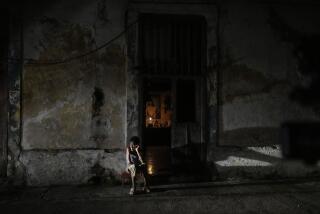Energy Crisis Forces Drastic Cutbacks in Cuba : Austerity: Dwindling Soviet fuel supply is blamed. Plants will be closed, transportation disrupted and up to 500,000 jobs put at risk.
- Share via
MEXICO CITY — Cuba announced Friday that it is closing many factories and curtailing public transportation, street lighting and television programming because of uncertainty over fuel supplies once guaranteed by the Soviet Union. The drastic energy-saving measures are expected to throw hundreds of thousands of Cubans out of work.
The cutbacks, which deepen two years of austerity for Cuba’s 10 million people, will also force the end of night baseball games, a popular pastime on the island, and limit the use of taxis to take people to hospitals and funerals.
They were reported inside Cuba by government news media and abroad by Prensa Latina, the official Cuban news agency.
The announcement said laid-off workers will be “relocated in useful tasks,” primarily in agriculture. Reuters news agency, in a dispatch from Havana, quoted a Cuban government official as saying that as many as 500,000 workers will be affected.
Cuba got 90% of its petroleum and 70% of its total imports from the Soviet Union in recent years, bartering its sugar and citrus instead of paying hard currency. The Soviets began curtailing their trade with Cuba in the late 1980s because of economic troubles at home and because of growing political differences with President Fidel Castro’s hard-line Communist government.
Moscow created an energy crisis in Cuba this year by reducing its annual petroleum commitment from 13 million metric tons to 10 million tons. The Cuban announcement on Friday said fewer than 9 million tons were delivered this year.
Castro sent an envoy to the Kremlin last month to seek continued oil shipments in 1992. Cuban officials did not report the mission’s results. But any accord has probably since been nullified by the Soviet Union’s collapse. Most of Cuba’s oil came from the Russian Federation, whose president, Boris N. Yeltsin, favors ending Moscow’s charitable trade subsidy with Havana.
Sen. Larry Pressler, a South Dakota Republican who visited Cuba last month, said Castro told him that deliveries from Soviet republics probably will not exceed 3 million tons in 1992. Other Cuban officials have said recently that Cuba will have to get by on one-third of its normal petroleum allotment.
Cuba acquired 200,000 bicycles in 1991 and began introducing horse- and ox-drawn farm machinery. Castro said recently that the government will build or buy another 1 million bicycles in 1992.
Friday’s announcement said television broadcasts on the island’s two channels are being reduced to five hours from Monday through Friday, nine hours on Saturday and 14 hours on Sunday. The new guidelines dictate severe limits on the use of electricity by state enterprises and private homes. Air conditioning will be cut off in public buildings, and many restaurants and movie theaters will close.
If Cuba fails to find alternative sources of fuel, the announcement said, “other reductions will be inevitable.”
Cuba has been unable to buy petroleum elsewhere because it lacks hard currency.
More to Read
Sign up for Essential California
The most important California stories and recommendations in your inbox every morning.
You may occasionally receive promotional content from the Los Angeles Times.













